Breville Barista Express vs Philips 3200: The former is great, but the latter is better.
The Philips 3200 is designed to let you whip up some caffeinated beverages without a barista-level experience. Simply load in your beloved coffee beans and milk, press a button, wait for a moment, and then savor the outcome. This one has a few one-touch drinks and a single boiler, but these are trade-offs for an affordable espresso machine.
The Breville Barista Express is also a formidable option in its price range. Despite its more than a decade-long presence in the market, it still keeps selling like hotcakes, and for good reason. But be prepared to spend some time tinkering with its steam wand before you can craft the flawless milk froth for your cappuccino.
Breville Barista Express Vs Philips 3200: Comparison Chart




Last update on 2025-04-13 / Affiliate links / Images from Amazon Product Advertising API
Breville Barista Express Vs Philips 3200: Differences
The Philips 3200 wins the Breville Barista Express with a score of 4-1. Keep reading for more information.
Coffee Flavour
Winner: Tie
Built-in Grinder
Both have one built-in grinder, removing the necessity of purchasing a separate grinder, thereby saving you both money and time otherwise spent diving deep into the world of espresso grinder research. The Barista Express has a stainless steel conical burr grinder, whereas the Philips 3200 features a ceramic flat burr grinder. And if you ask me, I personally think the latter has an edge.
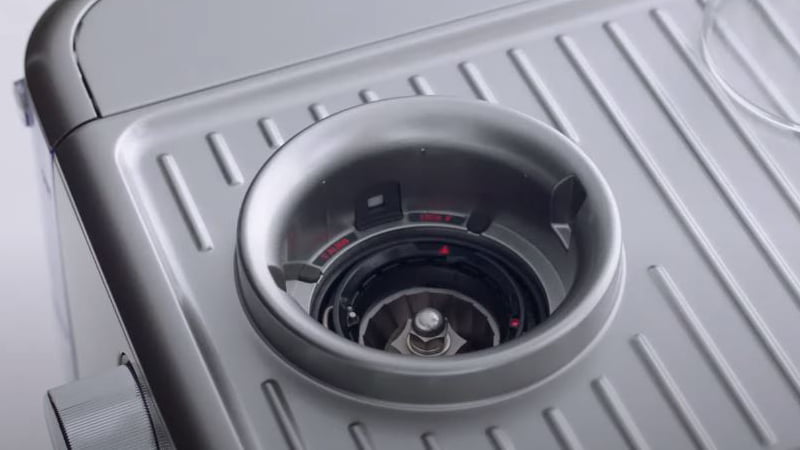
The first advantage that the ceramic grinder has over its stainless steel counterpart is quiet operation. This is a very big concern, especially for those who often find themselves surreptitiously making espresso early in the morning. My dude, you wouldn’t want to savor your espresso amidst grumblings of disrupted sleep, would you? It’s not a good way to start the day.
Moreover, the ceramic grinder doesn’t conduct heat as well as stainless steel. By preventing heat build-up, ceramic grinders may help maintain the integrity and full-bodied flavor of the coffee beans, and you will get a full-bodied cup of Joe.
However, the Breville Barista Express takes the lead with 16 grind settings, while the Philips 3200 has 12. But they generally offer a wider range of grinding sizes than the industry average, allowing you to dial in to get the perfect shot. Remember, only change the grind size while the grinder is in use, or it could lead to jamming. Also, Philips recommends not altering the grinder settings for the first 100 to 150 cups – I’ve had no trouble ignoring this, but it’s usually best to stick to what the manufacturer suggests.
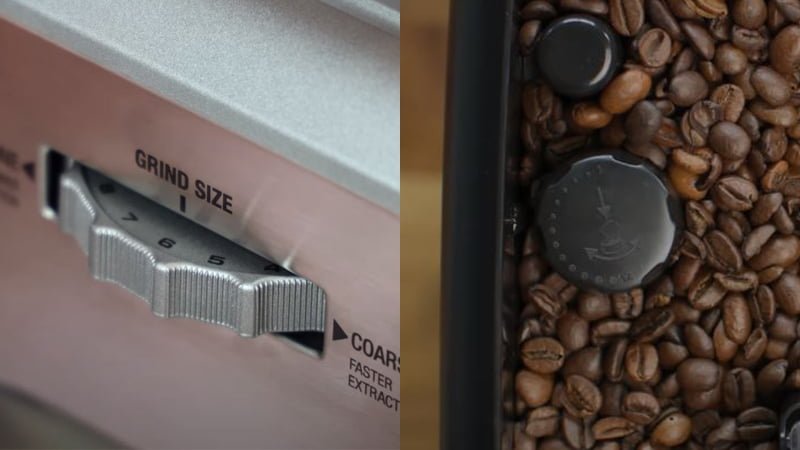
The Barista Express comes with a well-made 54mm portafilter, which will fit nicely in your hand, and a tamper, which is definitely better than the crummy plastic ones that come packaged with some Gaggia machines I’ve tested. The tamper isn’t really perfect, but it has enough weight to make it effective. It can be stored onboard via magnet to prevent the tamper from being misplaced. So if it were any heavier, I guess the magnet might not be able to hold it.
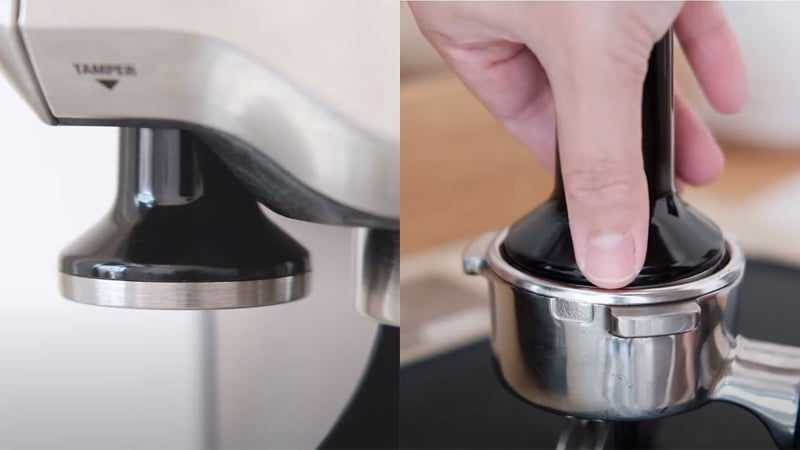
The Barista Express includes 4 portafilter baskets: single and double shot baskets for both single and double wall versions. All of them can be neatly stored in a slot at the back of the drip tray.
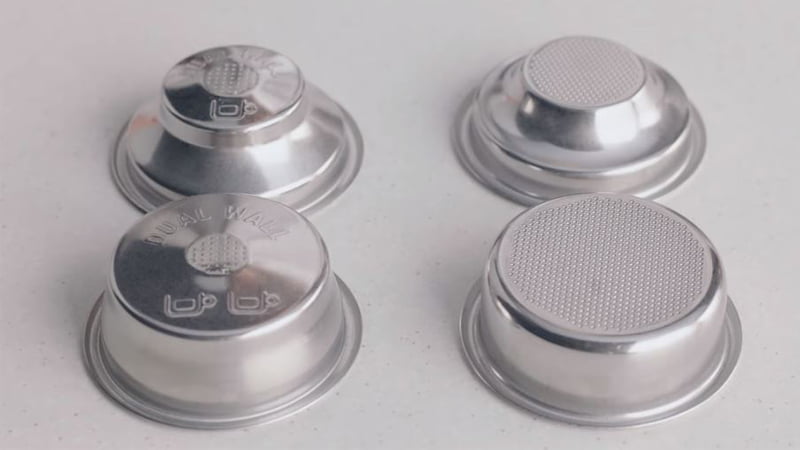
For those who don’t know, double-wall baskets (or pressurized baskets) are designed to be more forgiving and beginner-friendly since they can help pull a decent shot of espresso with inconsistent grind sizes. This is particularly beneficial for beginners who are still learning the nuances of espresso brewing.
Single-wall baskets, also known as non-pressurized or traditional baskets, are designed for more experienced baristas who have a good understanding of espresso brewing and want greater control over extraction. Using them requires a certain level of skill and technique, and obtaining the correct grind size is an absolute necessity.
Heating System
By the way, these machines can’t steam milk and pull espresso shots at once since they are single-boiler machines. But unlike traditional boiler machines, they switch quickly and seamlessly between processes with virtually no wait time.
Rather than a traditional boiler that takes 20-30 minutes to heat up, the Philips 3200 has thermoblock technology, which can reach the perfect temperature in just 20 seconds to be ready to brew espresso or steam milk – this is super quick! On the other hand, the Breville Barista Express, with its thermocoil heating system, takes slightly longer but can still heat up in about a minute.
The Barista Express requires a slightly longer warm-up time, but you can pre-warm your cup by putting it on top of the machine (known as a cup warmer), thereby preventing heat dissipation while your milk foam is being prepared. This ensures that your espresso retains its full-bodied flavor while you wait for the wand to reach its frothing temperature.
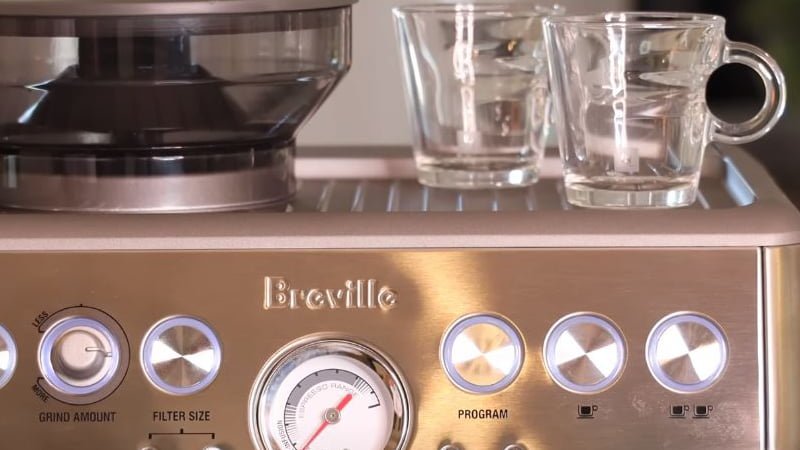
Brewing System
Both have a “pre-infusion” function, which is a vital step in espresso extraction. It basically slightly wets the coffee ground before full pressure is applied during the brewing process. This allows carbon dioxide to escape and aromas to begin to develop, which is the same principle as letting the coffee bloom when making pour-over coffee. The pre-infusion process not only helps you get the maximum flavor from the coffee beans but also reduces channeling risk, which may result in over/under extraction.
One thing that the Breville Barista Express has over its competitor is the ability to adjust the “bloom” phase (the factory-set time is 10 seconds) to suit your taste. This is really a cool feature since a longer or shorter pre-infusion interval can significantly influence the espresso taste profile.
After the pre-infusion period, both will extract espresso at a pressure of 15 bars, while the standard pressure for extracting espresso is around 9. For those who don’t know, unlike traditional drip or pour-over methods, these espresso machines employ pressure instead of gravity to pull a shot. When we say that an espresso machine operates at 15 bars, we’re saying that it uses pressure that’s approximately 15 times the atmospheric pressure at sea level to push hot water through very finely ground coffee.
My tests showed that the Breville produced perfect espresso with a thick crema layer on top. As for the Breville Barista Express, I found that it produced a somewhat diluted espresso with a scant crema layer – a problem that seems to stem from the espresso extraction being too fast. The Philips 3200 just pulled an espresso shot in about 15 seconds, significantly faster than the average of 30 seconds. In hindsight, I realized its filter basket had large holes, causing the water to flow through too rapidly and leading to a less bold and richly flavored espresso.
Milk Frothing System
The Breville Barista Express boasts a traditional-style steam wand, which has a learning curve, and you’ll have to try and fail a few times to get the perfect milk froth for your favorite drink. If you are a home barista or simply interested in latte art, you’ll be overjoyed with a great deal of control over the milk frothing process that the manual wand offers. But if you’re just a guy new to the world of espresso, the Philips 3200’s automatic milk frother could be your best bet.
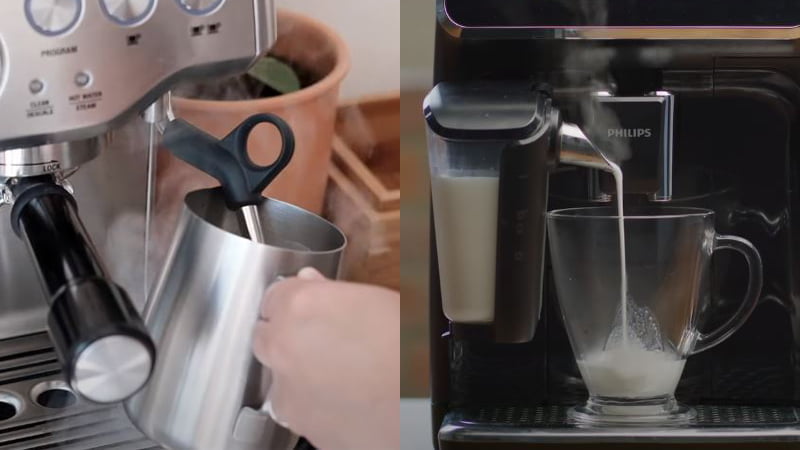
The professional-style wand of the Barista Express can rotate 360 degrees and features a rubber handle, allowing you to place your milk pitcher at the most convenient angle easily. Oh, yes, Breville also included a pitcher in the package – a generous gesture that I hope Jura takes note of and replicates.
Regarding frothing milk, you will need to fill the stainless steel carafe with your cool milk and ensure the wand is submerged in the milk at a convenient angle. Then keep going until you feel it is too hot to hold with your bare hand. It sounds like child’s play, but you really need to put in the time and effort to achieve satisfactory results.
The Philips 3200, on the other hand, comes with the LatteGo milk system, which facilitates frothing milk with just one touch. It includes a clear jug, a black plastic clip, and a top lid – There is no tube or hose where milk residue can collect, leading to extra cleaning. I found the lid flimsy since it just sit on the container without a hinge to secure it firmly.
By pushing a button, the Philips 3200 mixes milk and air at high speed in the frothing chamber, then pours it right into your cup. The entire process is quick, effortless, and completely hands-free – you certainly don’t need a barista’s training from Starbucks to perfect it.
The Barista Express did a good job of producing thick milk froth for an excellent cappuccino and silky, smooth microfoam for an eye-catching latte. Meanwhile, the Philips 3200 produces consistent, thick foam, which is better for a nice cappuccino than latte art.
Design & Usability
Winner: Philips 3200
Dimensions, Footprint, & Weight
| Breville Barista Express | Philips 3200 | |
|---|---|---|
| Dimensions | 12.5 x 13.8 x 15.9 inches | 8.6 x 13 x 16.9 inches |
| Weight | 23 lbs | 17.6 lbs |
The Breville Barista Express is a visually appealing espresso machine that seriously elevates the aesthetics of any kitchen. Constructed with a sturdy stainless steel casing, this one feels like a machine that’ll last a long time and reward you with loads of delightful espresso servings. Its control panel is very straightforward, so even beginners can quickly get to grips with the machine without spending hours poring over the manual. Adding to its functionality is a centrally-positioned pressure gauge that tells you whether your espresso is being extracted at the optimum pressure.
The Philips 3200 is a simple but flashy bean-to-cup machine as well, with a glossy black plastic-made finish and a few attractive chrome-like accents, lending it a refined, high-end look without costing an arm and a leg. There is a mammoth-sized non-touch screen on top that is intuitive and keeps all controls simple.
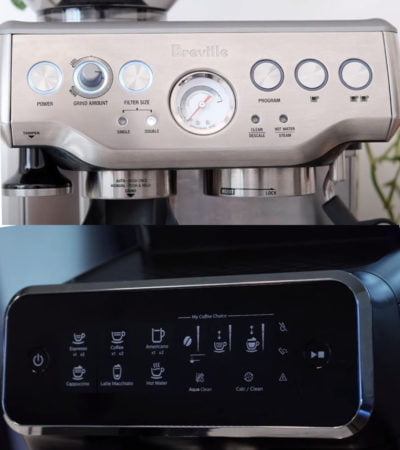
These machines are not bulky at all and can be displayed on any kitchen counter – just remember that their bean hoppers are top-accessible before fitting them underneath something like overhead cabinets. The Barista Express is pretty heavy, so it might prove a tough nut to crack for those who enjoy frequently rearranging their kitchen setups.
Pre-programmed Coffee Options
| Breville Barista Express | Philips 3200 |
|---|---|
| Espresso Hot Water | Espresso Black Coffee Americano Cappuccino Latte Macchiato Hot Water |
They have a very short list of one-touch drinks. So if you are after a machine for your workspace or any large environment, you will need to pay through the nose for higher-end machines.
Just like a barista who can fine-tune a drink to your taste, these machines offer several settings, enabling you to get the right recipe for your beans and palate. The Philips 3200 offers 3 levels of coffee strength, brew temperature, water dosage, and milk foam volume. This one also features a handy “stop” button, letting you cut off the espresso or milk froth flow when you believe your drink is ready.
On the other hand, the Breville Barista Express offers a wider range of coffee strengths and bestows upon you the liberty to alter the shot volume at will. Additionally, the brew temperature can be modified by ±2°C in precise 1°C increments from the factory-set temperature.
Both have a hot water function, which is handy whenever you want to make an americano (by diluting the espresso) or brew tea. So who needs a traditional kettle anymore? I liked that the Barista Express features a dedicated hot water dispenser that is next to the steam wand and can swivel in any direction. I always love such well-thought-out features! Meanwhile, the Philips 3200 requires removing the LatteGo milk system to draw hot water, which can be somewhat inconvenient.
Both allow the use of pre-ground coffee whenever you just need a quick decaf, or your beans are depleted. The Philips 3200 has a bypass doser chute specifically for this, so you don’t need to remove all the beans from the hopper. As for the Breville Barista Express, I recommend the pressurized basket
Spout & Cup Clearance
| Breville Barista Express | Philips 3200 | |
|---|---|---|
| Spout Type | Dual | Dual |
| Cup Clearance | 4 inches | 3-5.5 inches |
Both of these espresso machines can fit cups of various sizes, except a travel mug or an insulated jug, which, in my opinion, aren’t typical choices. As for the Breville Barista Express, its cup clearance is fixed at 4 inches, so you may need to elevate your cup somehow to keep your brew from splashing and to preserve that lovely crema. Oh well, you can easily remove the drip tray to accommodate a taller cup.
I found the Philips 3200’s milk dispenser was a bit too high relative to my cup when brewing a cappuccino. This is not a big deal, but I guess a miscalculation in positioning your cup could potentially lead to a spill, resulting in a mess on your counter.
Both can also brew two separate cups of espresso, which is a lifesaver for larger families during morning hours, allowing everyone to swiftly prepare their favorite caffeinated drinks before stepping out the door.
Water Reservoir & Bean Hopper
| Breville Barista Express | Philips 3200 | |
|---|---|---|
| Water Reservoir | 2 liter | 1.8 liter |
| Bean Hopper | 0.24 liter | 0.28 liter |
Their water tanks are large for home use, so unless you want to place the machine in a bustling space like your workplace, they do not need to be refilled several times a day. The tank of the Philips 3200 is conveniently located in the front, so accessing it is easier than the Barista Express’s rear-positioned reservoir.
The Philips 3200 comes with an AquaClean filter that requires descale after about 5,000 cups. Hence, if you brew three cups per day, for example, you won’t need to descale the machine for about five years. The Barista Express can likewise be paired with a Breville water filter to reduce the frequency of descaling and enhance the quality of the espresso. Of course, using the filter results comes with an ongoing monthly cost, which is essentially a trade-off for the privilege of less frequent descaling.
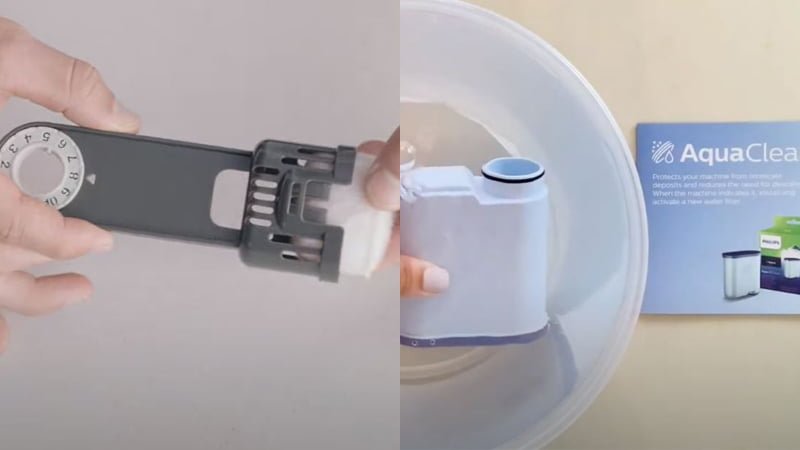
Their bean hoppers can’t hold large quantities of coffee beans, but they suffice for use within a few days, depending on the espresso consumption of your household. The Barista Express container can be completely removed for deep cleaning. Both machines also come with airtight lids to effectively shield the beans from air and sunlight exposure, thereby preserving their aroma and flavor for a long time.
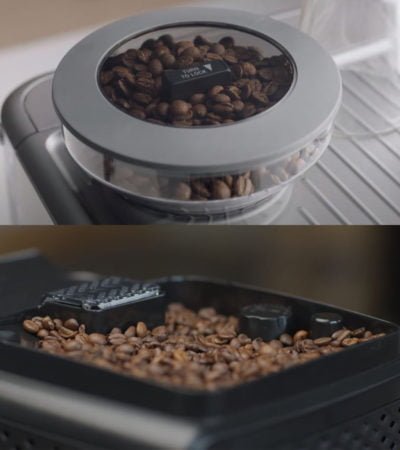
Cleaning & Maintenance
Winner: Philips 3200
Cleaning and maintaining these machines isn’t a hassle at all. You need to keep an eye on the distinctive symbols or lights featured on their control panels to know when descaling is required (refer to the user manual for more detail). The descaling process is automated in both machines, and you should only use the manufacturer-recommended descaling solution
Regarding cleaning the milk system, you will need to run steam through the Barista Express’s steam wand and give it a wipe using a damp rag or a steam wand cleaning tool after each use. The milk carafe of the Philips 3200 can be removed for thorough cleaning under running water. These tasks are paramount because neglecting the milk system will lead to bacteria and mold growth, which is a shortcut to ruining your drink’s flavor and posing serious health concerns.
I decided to give the winning ticket to the Philips 3200 as its brew group is removable. Yes, you will need to clean and lubricate it manually instead of relying on an automatic cycle, but this is the best way to maintain a brew unit. The ease of replacement, when required, is an added bonus as well.
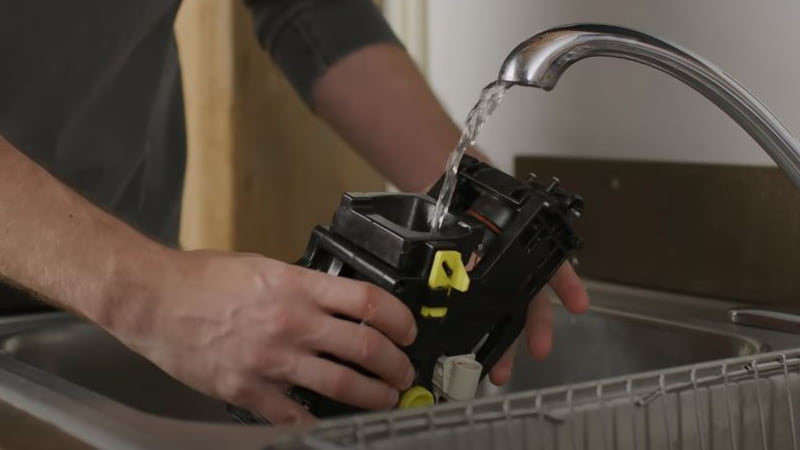
Utilities & Other Features
Winner: Philips 3200
Barista Express will automatically enter standby mode after 1 hour and turn off after 3 hours of inactivity for energy efficiency, which is a bit longer than I prefer. The Philips 3200 can also automatically turn off after a customizable interval: 15, 30, 45, or 60 minutes. This nifty feature not only contributes to reducing your electricity consumption and, in turn, your electricity bill but also promotes environmental conservation.
Quick Rundown Of Philips 3200
- 5 AROMATIC COFFEES: Enjoy your favorite coffees for special moments. Whether you crave an espresso, coffee, americano, cappuccino or a latte macchiato, your fully automatic espresso machine delivers a perfect in-cup result with no hassle and in no time.
- INTUITIVE TOUCH DISPLAY: The irresistible taste and aroma of coffee from fresh beans is just one touch away. Our intuitive touch display allows you to easily select your favorite coffee.
- PERFECT TEMPERATURE AND AROMA: The Aroma Extract system intelligently strikes the optimum balance between brewing temperature and aroma extraction.
- 2 PARTS, NO TUBES MILK SYSTEM: Our 2 parts milk system has no tubes or hidden parts and can be cleaned in as little as 15 seconds under tap or in the dishwasher.
- AQUACLEAN FILTER: By changing the filter after being prompted by the machine, you will not need to descale your machine for up to 5,000 cups, while enjoying clear and purified water.
Last update on 2025-04-13 / Affiliate links / Images from Amazon Product Advertising API
Quick Rundown Of Breville Barista Express
- The Breville Barista Express delivers third wave specialty coffee at home using the 4 keys formula and is part of the Barista Series that offers all in one espresso machines with integrated grinder to go from beans to espresso in under one minute
- DOSE CONTROL GRINDING: Integrated precision conical burr grinder grinds on demand to deliver the right amount of freshly ground coffee directly into the portafilter for your preferred taste with any roast of bean
- OPTIMAL WATER PRESSURE: Low pressure pre-infusion gradually increases pressure at the start and helps ensure all the flavors are drawn out evenly during the extraction for a balanced tasting cup
- PRECISE ESPRESSO EXTRACTION: Digital temperature control (PID) delivers water at precisely the right temperature, ensuring optimal espresso extraction
- MANUAL MICROFOAM MILK TEXTURING: The powerful steam wand performance allows you to hand texture microfoam milk that enhances flavor and enables creation of latte art
Last update on 2025-04-13 / Affiliate links / Images from Amazon Product Advertising API
Product Video
Related Articles to Philips 3200
- Saeco Picobaristo Vs Philips 3200: A Detailed Face-Off Comparison
- Philips 3200 Vs Breville Barista Pro: An Honest Comparison
- Saeco Xelsis Vs Philips 3200: Choosing the Better One!
- Jura D6 vs Philips 3200: Can The Affordable Philips 3200 Beat The Mid-Range Jura D6?
- Jura E8 Vs Philips 3200: A Head-To-Head Comparison
- Jura E6 vs Philips 3200: Can Philips 3200 Surpass A Mid-range Machine Like E6?
- Jura A1 vs Philips 3200: Check Out My Honest Comparison For These Potent Espresso Machines
- Philips 3200 vs 3100: Reviewing 2 Cut-Price Espresso Machines
- Philips 3200 vs Terra Kaffe: Classic vs Contemporary – Which One Will Win?
- Philips 3200 Vs Saeco Incanto: A Honest Review & Detailed Comparison
- Philips 3200 vs 5000: Which Is The Best Espresso Machine For Your Budget?
- Philips 3200 vs Delonghi Magnifica XS: 4 Major Differences In Flavor, Milk Frothing, And More
- Philips 3200 Vs 5400: An Honest Comparison Between Two Machines With Various One-touch Beverages
- Philips 3200 LatteGo vs 4300: Which One Is Your Best Bet?
- Philips 3200 Vs 1200: Are They Value For Money?
- Breville Barista Touch Vs Philips 3200: Which One Is Your Best Choice?
- DeLonghi Dinamica Plus Vs Philips 3200 LatteGo: Honest Review & Detailed Comparison
Related Articles to Breville Barista Express
- Breville Barista Express Vs Rancilio Silvia: How Are They Different?
- Breville Nespresso Creatista Plus Vs Barista Express – Which Machine Is Suitable For You?
- Saeco Incanto vs Breville Barista Express: Is Super-automatic Machines Always Better Than Semi-automatics?
- Gaggia Brera vs Breville Barista Express: Don’t Miss My Review On These 2 Affordable Entry Espresso Machines
- Gaggia Anima Vs Breville Barista Express: Battle Of Two Budget-Oriented Espresso Machines!
- Delonghi Magnifica S Smart vs Breville Barista Express: Comparison Of 2 Very Distinctive Espresso Makers
- An Honest Review Of Breville Barista Express vs Oscar 2: Brew Performance, Milk Frother, And More!
- Breville Barista Express vs Delonghi Magnifica XS: An Honest Review Of My Real Experience With These Machines
- Barista Express 870 vs 875: Is There Any Difference Between These Models? – Quick Comparison
- Delonghi Magnifica S vs Breville Barista Express: Which One Brews Tastier Coffee?
- Breville Duo Temp Pro vs Barista Express: Why you should go for the Barista Express
- Breville Oracle Touch Vs Barista Express: Competition Between 2 Top Breville Machines
- Breville Bambino Plus Vs Barista Express: 4 Hot Features You Need To Know
- Breville Dual Boiler Vs Barista Express: A Wonderful Comparision For You
- Breville Barista Express Vs Delonghi La Specialista: Detailed Comparison!
- Breville Barista Express Vs Barista Pro: A Detailed Side-By-Side Comparison
- Breville Creatista Plus Vs Barista Express: Don’t Miss This Incredible Comparison
- Breville Barista Express vs Infuser: A Battle Between 2 Great Espresso Machine
- Barista Express Vs Oracle: Which Breville Espresso Machine Is Best for You?
- Barista Express Vs La Specialista: A Hot Comparision You Should Not Miss
- Breville Barista Express Vs Gaggia Classic Pro: Which Is A More Suitable Purchase?
- Breville Barista Express vs Bambino: Battle Of the 2 Top Beginner Coffee Machines On the Market
- Barista Express Vs Barista Touch: Which One You Should Choose?
- Breville Barista Express Vs Bambino Plus: Amazing Comparison You Should Read
- Nespresso Creatista Plus vs Breville Barista Express: What Is The Best Choice For Home Use?
- Breville Cafe Roma vs Barista Express: What Is the Best Espresso Machine?
References:
- Philips 3200: https://www.philips.com.my/c-e/ho/coffee/philips-lattego-3200-series
- Barista Express: https://www.breville.com/us/en/products/espresso/bes870.html

I’m Floyd J. Alcock, an experienced barista with a deep love for coffee. I curate personalized coffee experiences, guiding customers through diverse flavor profiles and suggesting ideal brewing methods. My extensive knowledge of espresso machines enables me to recommend the best equipment to match specific needs and budgets. Sharing my expertise and passion with coffee enthusiasts brings immense satisfaction. I look forward to continuing my journey of coffee discovery with every customer I serve, fostering connections over a shared love for this magical beverage.
